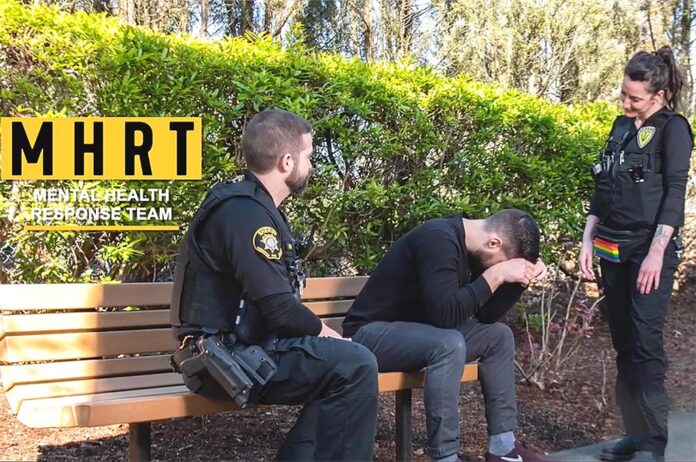City funding, police officers will work with Lifeworks NW clinicians
Tigard, Tualatin and Sherwood police departments will bolster their response to people in mental health crisis in the coming year after the three cities agreed to help fund an expansion of Washington County’s Mental Health Response Team.
Each of the three cities will be pitching in to help fund an additional mental health clinician, who will partner with local police officers as they respond to calls for service involving persons in a mental health crisis. The new team is formally a part of Washington County’s existing Mental Health Response Team (MHRT), which is comprised of two Washington County Sheriff’s Deputies and two mental health clinicians who are assigned to the entire county. The new team, by contrast, will primarily respond to calls in those jurisdictions, but could respond outside the area in cases where other assets were not available.
The move is being welcomed with open arms by local police, said Tigard Police Department Commander Jamey McDonald.
“Part of the reason for it is that while that service is available to us, oftentimes it is not available when we need it,” McDonald told Tigard’s Public Safety Advisory Board at its April 26 meeting. “And by partnering with Tualatin and Sherwood and using this teamwork down here, it would give us a better chance of having team members available when we need them.”
The City of Tigard is using $50,000 in asset forfeiture money to pay for its share of a clinician’s salary for fiscal year 2021-22. The cities of Tualatin and Sherwood, meanwhile, are also chipping in to help fund what both police and mental health professionals see as a critical tool in aiding first responders across the county.
County officials say they are excited about the expansion of the MHRT, which was created in 2011.
“We’ve always wanted to grow the team,” said Kristin Burke, the Special Projects Supervisor for Washington County Health and Human Services. “When you only have two teams in a county as big as ours, that can get challenging at times. There’s always been a desire to turn it into an interagency model.”
McDonald recounted an April 25 incident as just one reason why Tigard officers are in favor of creating a new team. In that call for service, a woman reportedly stripped off her clothing and ran into traffic, causing a potentially dangerous situation for herself and others.
“We ultimately got her into custody and to the hospital for a mental health evaluation, but not before our officers were confronted quite aggressively by members of the community about why we were responding to a mental health call,” McDonald said. “But that just underscores the need for this type of service. There was nobody else to go to help this person.”
That should soon change for the better.
The MHRT team pairs sheriff’s deputies or police officers with master’s level mental health clinicians from Lifeworks NW, a nonprofit group that provides mental health and addiction services in the Portland metro area. It’s a different model than the nationally-renowned Crisis Assistance Helping Out On The Streets, or CAHOOTS, which has operated in Eugene for over 25 years. The latter employs mental health experts responding to calls for assistance on their own, a model not favored by Washington County officials.
“The law enforcement officers are so critical,” Burke said. “And when you’re talking about the safety of the clinicians, it is paramount; they can’t provide a response if they can’t do it safely.”
Al Roque, Chief Deputy for the Washington County Sheriff’s Office, agrees. He said that pairing a police officer with a clinician gives responders a sense of security while also allowing an immediate response on the medical side, with an ability to follow up afterward with appropriate care where needed.
“That’s the key component,” Roque said. “The team is really good at understanding where the line is between the medical side and the law enforcement side. There’s a hard line in terms of access to information, knowledge and ability to share information, so those things flow together really well.”
Kris Puttler-Miller, a program director at Lifeworks NW, said the details of how each local agency will assign personnel to the new response teams are still being worked out. She noted that a similar expansion is being carried out in Hillsboro and Beaverton, as well.
“I think we’re still in the coordination phase with those agencies in terms of how exactly it’s going to work,” she said.
The hope, Burke added, is eventually to have as many as four response teams on duty at a time across the county.
“We’re working on the details on how to spread it out,” she said, “But our goal is to make sure the service is more accessible throughout the county.”






















